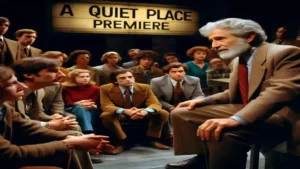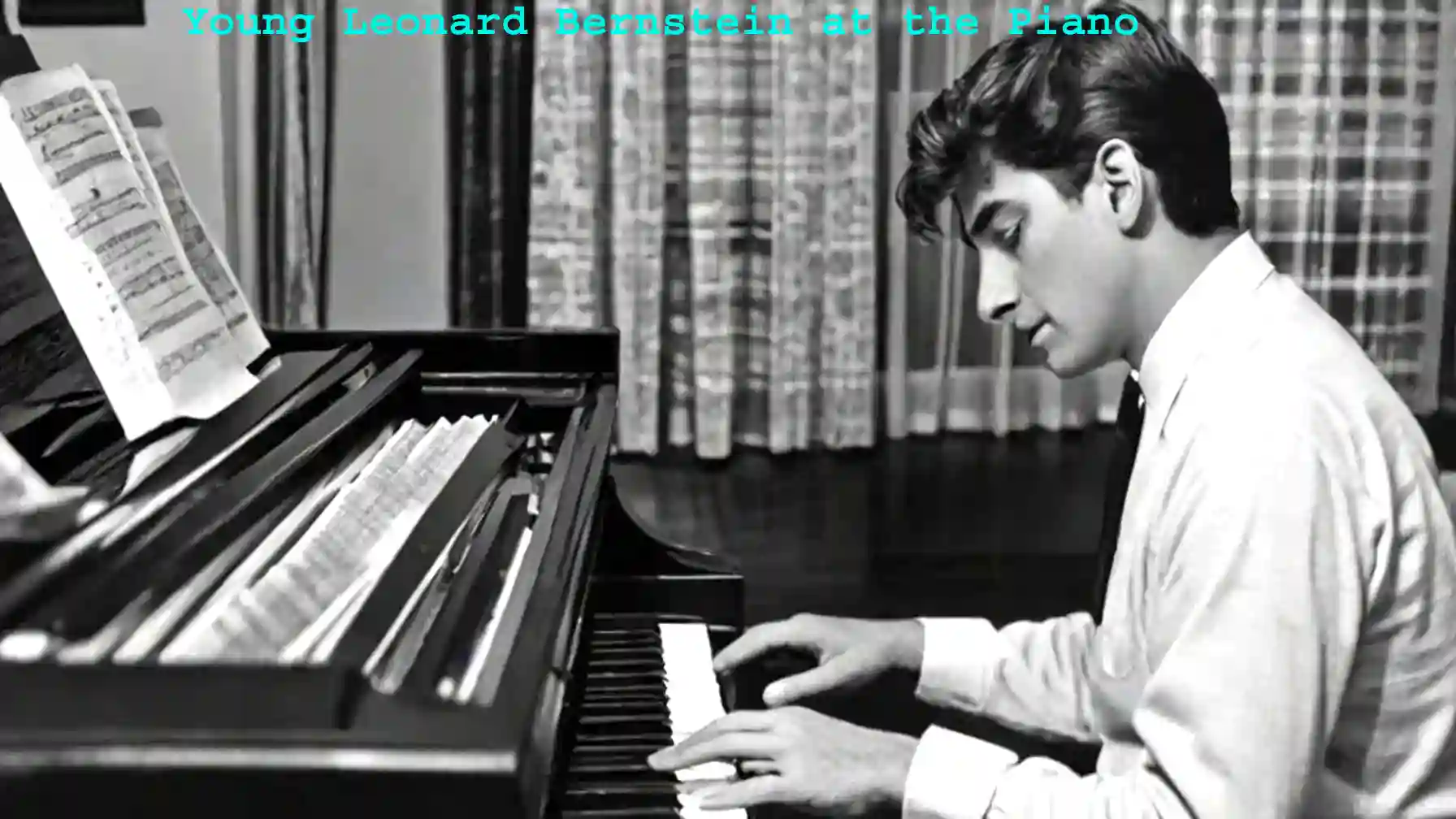Did you know Leonard Bernstein wasn’t just a conductor? He was also a passionate civil rights activist who championed social justice through music. Today, we delve into the life of this iconic maestro. We’ll explore his groundbreaking compositions like West Side Story and his lasting impact on the world of classical music. Join us as we unravel the story behind the genius known simply as Leonard Bernstein.
Exploring the Life and Legacy of Musical Genius Leonard Bernstein:
Born on August 25, 1918, in Lawrence, Massachusetts, Leonard Bernstein displayed an innate musical talent from a young age. Raised in a Jewish immigrant family, he was immersed in music and culture early on. His passion for music led him to attend Harvard University and later the Curtis Institute of Music.
In the 1940s, Bernstein’s career soared as he conducted renowned orchestras and composed groundbreaking pieces like “Fancy Free” and “On the Town.” It was during this time that his distinctive style began to emerge – blending classical tradition with elements of jazz and musical theatre.
The pinnacle of Bernstein’s career came with the iconic West Side Story in the 1950s. This timeless masterpiece redefined American musical theater and solidified his status as a visionary composer. Throughout the ensuing decades, Bernstein continued to push boundaries with innovative works like Mass and A Quiet Place while championing social causes close to his heart.
Also Read: Internship Benefits: Bridging Education and Professional Careers
Leonard Bernstein’s legacy extends far beyond his music; it encompasses his unwavering activism for civil rights, peace movements, humanitarian efforts, AIDS research advocacy, philanthropy initiatives – truly embodying the essence of artistry intertwined with a profound sense of humanity.
Early Life and Education of Leonard Bernstein:
Leonard Bernstein’s early life laid the foundation for his future musical genius. Born in 1918, he grew up in a Jewish household in Massachusetts where music played a significant role. His family recognized his talent early on and provided him with piano lessons, igniting his passion for music.
In the 1930s, Bernstein delved into higher education at Harvard University. Despite studying subjects like business and humanities, music remained his true love. It wasn’t long before he pursued formal training at the Curtis Institute of Music in Philadelphia to hone his craft as a pianist and composer.
These formative years shaped Bernstein’s artistic vision and set him on the path to become one of the most celebrated composers of the 20th century.
1918–1935: Early life and family
Leonard Bernstein’s early life was marked by a deep love and appreciation for music, born on August 25, 1918, in Lawrence, Massachusetts. Growing up in a Jewish family, his parents recognized his musical talent from a young age. His father’s purchase of a used piano sparked Bernstein’s passion for music.
Despite facing financial struggles during the Great Depression, his family always supported his musical pursuits. After excelling in piano lessons as a child, he continued to hone his skills throughout high school.
In 1935, Leonard Bernstein began studying at Harvard University where he majored in Music Theory and Composition. It was during this period that he started developing the innovative style that would define his future career.
His formative years were filled with inspiration from various musical genres and cultures which would later influence his groundbreaking compositions and performances.
1935–1941: College years
Leonard Bernstein’s college years from 1935 to 1941 were a pivotal period in shaping his musical genius. Attending Harvard University, he immersed himself in music theory and composition, honing his craft under some of the best mentors.
Bernstein’s passion for conducting also flourished during this time as he conducted various orchestras and ensembles on campus. His innate talent and charisma on the podium captured the attention of many, foreshadowing his future success.
In addition to music, Bernstein delved into literature, philosophy, and sociology, expanding his intellectual horizons beyond just notes and melodies. This multidisciplinary approach influenced his compositions and performances throughout his career.
The vibrant cultural scene at Harvard provided Bernstein with ample opportunities to collaborate with fellow artists and explore new musical styles. These experiences laid a strong foundation for him to break boundaries in classical music later on.
Leonard Bernstein’s college years were instrumental in nurturing his creativity and setting him on the path towards becoming one of the most influential composers and conductors of the 20th century.
Remarkable Career Journey of Leonard Bernstein:
In the 1940s, Leonard Bernstein’s career took off with his remarkable rise to prominence in the music world. His exceptional talent as a conductor and composer quickly garnered attention, leading to numerous opportunities for collaboration and recognition.
During the 1950s, Bernstein experienced a significant expansion of his career with iconic works like “West Side Story,” which solidified his status as a musical genius. This period marked a turning point in his artistic journey, showcasing his versatility and innovation.
The 1960s saw Bernstein pushing boundaries and embracing new forms of expression at Lincoln Center. His groundbreaking compositions and performances captivated audiences worldwide, setting him apart as a visionary in the classical music realm.
As the 1970s unfolded, Bernstein continued to captivate listeners with works like “Mass” and “Dybbuk,” earning international acclaim for his daring creativity. His ability to blend tradition with modern influences resonated deeply with fans around the globe.
In the 1980s, Bernstein further cemented his legacy with works like “A Quiet Place” and contributions to Tanglewood that showcased his enduring passion for music education and performance excellence.
1940s: Rise to prominence
In the 1940s, Leonard Bernstein’s career skyrocketed as he gained recognition for his exceptional talent and innovative compositions. His work as a conductor and composer began to captivate audiences worldwide, solidifying his place in the musical landscape.
During this decade, Bernstein’s collaborations with various orchestras and opera houses helped shape his unique style and approach to music. He embraced a blend of classical traditions with modern influences, setting him apart from his contemporaries.
Bernstein’s rise to prominence was marked by groundbreaking performances and memorable works that showcased his versatility and creativity. His ability to infuse emotion and depth into each piece resonated with listeners of all backgrounds.
By pushing boundaries and challenging conventions, Bernstein established himself as a trailblazer in the world of classical music during the 1940s. This period laid the foundation for his future successes and enduring legacy that continues to inspire generations of musicians today.
1950s: Career expansion and West Side Story
The 1950s were a transformative decade for Leonard Bernstein, marked by significant career expansion and the creation of one of his most iconic works, West Side Story. This groundbreaking musical redefined the genre with its modern retelling of Shakespeare’s Romeo and Juliet set in New York City. Bernstein’s collaboration with lyricist Stephen Sondheim resulted in timeless songs like “Maria” and “Tonight”, capturing the essence of love and conflict.
West Side Story premiered on Broadway in 1957 to critical acclaim, showcasing Bernstein’s versatility as a composer who seamlessly blended classical music elements with jazz and Latin rhythms. The musical tackled themes of prejudice, gang violence, and love across cultural divides, resonating deeply with audiences then and now.
Bernstein’s innovative approach to storytelling through music solidified his reputation as a visionary artist pushing boundaries in the world of musical theater. His work on West Side Story remains a testament to his enduring legacy as a trailblazer in American music history.
1960s: Innovations and Lincoln Center
In the 1960s, Leonard Bernstein continued to push boundaries and innovate in the world of music. His tenure as the Music Director of the New York Philharmonic saw him introducing new works by contemporary composers while also exploring lesser-known pieces from the classical repertoire.
Bernstein’s influence extended beyond conducting as he delved into composing for various mediums including symphonies, ballets, and operas. During this decade, he composed groundbreaking works like “Chichester Psalms” and “Symphony No. 3: Kaddish,” showcasing his versatility and creativity.
One of Bernstein’s most significant achievements in the ’60s was his involvement in founding the Lincoln Center for Performing Arts in New York City. This cultural hub provided a platform for artists across disciplines to collaborate and showcase their talents on a grand scale.
Through his innovative compositions and dedication to promoting arts education at Lincoln Center, Bernstein solidified his legacy as not just a musical genius but also a visionary leader shaping the cultural landscape of America during this transformative era.
1970s: Mass, Dybbuk and international acclaim
In the 1970s, Leonard Bernstein continued to push boundaries and explore new musical territories. One of his notable works during this decade was “Mass”, a groundbreaking piece that blended elements of both classical and contemporary music. This ambitious composition challenged traditional conventions and showcased Bernstein’s versatility as a composer.
Another significant work from this period was “Dybbuk”, an opera based on S. Ansky’s play about Jewish folklore and mysticism. Bernstein’s interpretation of the story resonated with audiences worldwide, further solidifying his reputation as a visionary in the world of music.
As Bernstein’s career continued to soar, he garnered international acclaim for his innovative compositions and bold artistic choices. His ability to connect with audiences on a profound emotional level set him apart as a true musical genius whose influence extended far beyond the concert hall.
1980s: A Quiet Place, and Tanglewood
In the 1980s, Leonard Bernstein’s career saw a continuation of his creative brilliance with works like “A Quiet Place” and his close association with Tanglewood.
“A Quiet Place,” an opera that delves into themes of family dynamics and emotional turmoil, showcased Bernstein’s ability to blend different musical styles seamlessly. It was met with critical acclaim for its innovative approach to storytelling through music.
Tanglewood, a renowned music festival in Massachusetts, held significant importance for Bernstein. Serving as the festival’s Music Director for many years, he nurtured emerging talents while also conducting iconic performances.
Bernstein’s time at Tanglewood allowed him to inspire future generations of musicians and composers through his mentorship and groundbreaking performances. The impact of these experiences would resonate far beyond the 1980s, shaping the landscape of classical music for years to come.
Leonard Bernstein: Death and Legacy
The world mourned the loss of Leonard Bernstein on October 14, 1990, when he passed away at the age of 72. His death marked the end of an era for classical music and musical theater alike. Despite his physical absence, his legacy continues to resonate through generations.
Bernstein’s impact on music transcends time; his compositions and performances still captivate audiences worldwide. He left behind a rich body of work that includes symphonies, operas, ballets, and iconic Broadway musicals like “West Side Story.”
His influence extended beyond music as well. Bernstein was an outspoken advocate for social justice causes and used his platform to champion civil rights, peace efforts during the Vietnam War, nuclear disarmament initiatives, AIDS research advocacy, and philanthropic endeavors.
Today, Leonard Bernstein is remembered not only as a musical genius but also as a passionate humanitarian who used his talents to inspire change and make the world a better place.
Leonard Bernstein: Social Activism and Humanitarian Efforts
Leonard Bernstein’s impact extended far beyond the realm of music. Known for his passionate advocacy, he used his platform to champion various social causes and humanitarian efforts throughout his career.
From civil rights to anti-war movements, Bernstein fearlessly lent his voice in support of justice and equality. Leonard Bernstein’s involvement in initiatives such as nuclear disarmament demonstrated his dedication. He also championed AIDS research, highlighting his commitment to global change.
Also Read: A Brief History of Time: Revolutionizing Our View of the Cosmos
One of Bernstein’s notable endeavors was his collaboration with renowned cellist Mstislav Rostropovich in raising awareness about human rights violations in the Soviet Union. This partnership not only highlighted their shared belief in freedom but also shed light on the power of art as a tool for social change.
Bernstein’s philanthropic contributions towards causes close to his heart left an indelible mark on society, inspiring future generations to use their talents for the betterment of humanity.
Civil rights
Civil rights were a central focus for Leonard Bernstein throughout his life. He used his platform as a renowned composer and conductor to advocate for equality and justice. During the Civil Rights Movement in the 1960s, Bernstein actively supported African American musicians by conducting integrated performances.
He believed that music had the power to bridge divides and bring people together regardless of race or background. Bernstein’s commitment to civil rights extended beyond just words – he took tangible actions to promote diversity and inclusivity in the music industry.
By engaging with diverse communities and showcasing talented artists from all backgrounds, Bernstein challenged systemic racism within classical music. His efforts paved the way for greater representation and opportunities for marginalized groups within the industry.
Bernstein’s legacy as a champion of civil rights continues to inspire individuals today to use their talents and influence for social change.

Anti-Vietnam war efforts
During the turbulent times of the Vietnam War, Leonard Bernstein utilized his platform as a renowned composer and conductor to advocate for peace. He openly expressed his opposition to the war through various musical compositions and public statements. Bernstein believed in using music as a powerful tool for social change, hoping to inspire unity and understanding amidst divisive conflicts.
His anti-Vietnam War efforts were not limited to words or music alone; he actively participated in protests and demonstrations, lending his voice to the growing movement against military intervention. By engaging with activists and fellow artists, Bernstein amplified his message of peace and reconciliation on a global scale.
Through his unwavering commitment to promoting dialogue and empathy, Leonard Bernstein left an indelible mark on the anti-war movement of his time. His legacy continues to inspire generations to use art as a catalyst for positive change in times of turmoil.
Rostropovich and the Soviet Union
Leonard Bernstein’s connection with the Soviet Union was further strengthened through his collaboration with renowned cellist and conductor, Mstislav Rostropovich. Their artistic partnership transcended cultural barriers and political tensions of the Cold War era. Rostropovich’s passionate performances resonated deeply with Bernstein, leading to a shared commitment to musical excellence and cultural diplomacy.
The two artists defied geopolitical divides by showcasing their mutual respect and admiration for each other’s work. Bernstein’s compositions often reflected his belief in the power of music to unite people across borders, making him a compelling figure in fostering understanding between East and West during a tumultuous period in history.
Rostropovich’s unwavering support for Bernstein’s music not only elevated their collaborative efforts but also highlighted the universal language of art that transcends ideological differences. Together, they exemplified how music has the ability to bridge divides and promote harmony amidst discord.
Nuclear disarmament
Leonard Bernstein’s dedication to nuclear disarmament was a key aspect of his humanitarian efforts. He used his platform as a renowned composer and conductor to advocate for global peace and the elimination of nuclear weapons.
During the height of the Cold War, Bernstein actively spoke out against the arms race between the United States and the Soviet Union. He believed that investing in peace-building initiatives rather than military escalation was crucial for ensuring a safer world for future generations.
Through his music and public speeches, Bernstein aimed to raise awareness about the catastrophic consequences of nuclear warfare. He participated in numerous events and campaigns focused on promoting dialogue, diplomacy, and disarmament among nations.
Bernstein’s unwavering commitment to nuclear disarmament continues to inspire activists and artists worldwide to use their voices for positive change and peaceful resolutions amid political tensions.
Advocacy for AIDS research and patient care
Leonard Bernstein was not only a musical genius but also a passionate advocate for various social causes. In the realm of healthcare, he significantly advocated for AIDS research and patient care. This was during the epidemic’s height in the 1980s. With his platform as a renowned composer and conductor, Bernstein used his influence. He raised awareness about the importance of funding research to combat HIV/AIDS.
He supported organizations dedicated to providing care and support for those affected by the disease, recognizing the urgent need for compassionate treatment and education. Bernstein’s advocacy helped destigmatize AIDS and encouraged public discourse surrounding this critical health issue.
Through benefit concerts, fundraising events, and public statements, he tirelessly worked towards improving access to medical resources for individuals living with HIV/AIDS. His efforts contributed to advancing research initiatives and promoting greater understanding and empathy towards those impacted by the epidemic.
Bernstein’s commitment to advocating for AIDS research and patient care exemplifies his dedication not only to music but also to making a positive impact on society’s most pressing issues.
Philanthropy
Leonard Bernstein’s philanthropic endeavors were as impactful as his musical legacy. Throughout his life, he dedicated time and resources to various causes close to his heart. From supporting civil rights initiatives to advocating for AIDS research and patient care, Bernstein used his influence to make a difference in the world.
His commitment to nuclear disarmament further solidified his reputation as a humanitarian. By leveraging his platform, Bernstein raised awareness about the urgent need for global cooperation in reducing nuclear threats.
In addition to contributing financially, he actively engaged in advocacy work, pushing for positive change on a significant scale. His philanthropy extended beyond mere donations; it was rooted in genuine care for humanity’s well-being.
Bernstein’s dedication to philanthropy serves as an inspiration for future generations of artists and activists alike. Through his generosity and passion for social causes, he left an indelible mark on both the music industry and society at large.
Leonard Bernstein: Influence and Characteristics:
Leonard Bernstein’s influence on the world of music is undeniable. His eclectic style combined elements of classical, jazz, and Broadway genres, creating a distinct sound that resonated with audiences worldwide. As a conductor, composer, and educator, Bernstein pushed boundaries and challenged traditional norms in the industry.
His charismatic personality and passion for music made him a beloved figure among musicians and fans alike. Bernstein’s ability to connect emotionally with his audience through his performances set him apart as a true musical genius.
Known for his innovative approach to conducting and interpreting musical pieces, Bernstein brought new life to many classical works. His interpretations were often bold, dynamic, and full of emotion – characteristics that defined his unique style.
Bernstein’s legacy continues to inspire generations of musicians and composers who strive to emulate his creativity and fearlessness in pushing artistic boundaries.
Audio recordings:
When it comes to exploring the musical genius of Leonard Bernstein, we can’t overlook the impact of his audio recordings. Bernstein’s recordings encapsulate his passion and brilliance in a tangible form that music lovers worldwide cherish.
From symphonies to operas, Bernstein’s interpretations are renowned for their depth and emotion, showcasing his unparalleled talent as a conductor and musician. Each recording is a testament to his dedication to perfection and innovation in classical music.
Listening to Bernstein’s audio recordings allows us to immerse ourselves in the beauty of his artistry, experiencing firsthand the magic he brought to each performance. His attention to detail and expressive conducting style shine through in every note, captivating audiences across generations.
Whether you’re a seasoned classical music enthusiast or a newcomer eager to discover Bernstein’s work, delving into his vast collection of audio recordings is sure to be a rewarding journey filled with inspiration and awe.
Leonard Bernstein: Bibliography
Leonard Bernstein’s bibliography is a treasure trove for music enthusiasts and scholars alike. With an impressive list of compositions, writings, and educational materials, Bernstein’s bibliography reflects his multifaceted genius. From iconic works like “West Side Story” to symphonies and operas that showcase his innovative style, each piece in his bibliography tells a story of creativity and passion.
Beyond his musical compositions, Bernstein also left behind a collection of insightful writings on music theory, education, and cultural commentary. His books offer a glimpse into the mind of a true visionary who not only composed breathtaking music but also shared his knowledge with the world.
Exploring Leonard Bernstein’s bibliography is like taking a journey through the evolution of American music in the 20th century. It provides valuable insights into his influences, techniques, and enduring legacy that continues to inspire generations of musicians around the globe.
Leonard Bernstein Videography: Capturing the Maestro’s Legacy in Music and Activism
Leonard Bernstein’s impact on the world of music extends beyond his compositions and performances. His videography showcases his captivating presence and magnetic personality, allowing audiences to experience his genius firsthand. From conducting iconic orchestras to delivering insightful lectures, Bernstein’s videos capture his passion for music and education.
In these recordings, viewers can witness Bernstein’s dynamic conducting style, where every movement of his baton seems to breathe life into the music. His charismatic stage presence shines through as he effortlessly commands the attention of both musicians and audiences alike.
Moreover, Leonard Bernstein’s educational videos offer a glimpse into his remarkable ability to break down complex musical concepts. He does this with clarity and enthusiasm. Whether exploring the nuances of a symphony or dissecting the structure of an opera, Bernstein’s teaching resonates. His insights appeal to both aspiring musicians and seasoned professionals alike.
Through his videography, Leonard Bernstein continues to inspire generations of music lovers around the world, leaving behind a rich legacy that transcends time.
Accolades and Recognition:
Leonard Bernstein’s legacy is marked not only by his groundbreaking musical compositions and innovative conducting techniques. He also received numerous awards throughout his illustrious career. His contributions to the world of music earned him prestigious accolades: 16 Grammy Awards, including a Lifetime Achievement Award, 7 Emmy Awards, and 2 Tony Awards.
While Leonard Bernstein declined the National Medal of Arts, he received the Presidential Medal of Freedom in 1985. This honor recognized his exceptional cultural contributions. Additionally, Bernstein’s impact on music education earned him honorary membership in Phi Mu Alpha Sinfonia, a national fraternity for men in music.
Furthermore, Leonard Bernstein’s influence extended beyond classical music into popular culture. He earned a star on the Hollywood Walk of Fame, showcasing his widespread recognition. This accolade underscores his talent and dedication to pushing artistic boundaries. Reflecting on his life, Bernstein stands as a pivotal figure in 20th-century music history.








